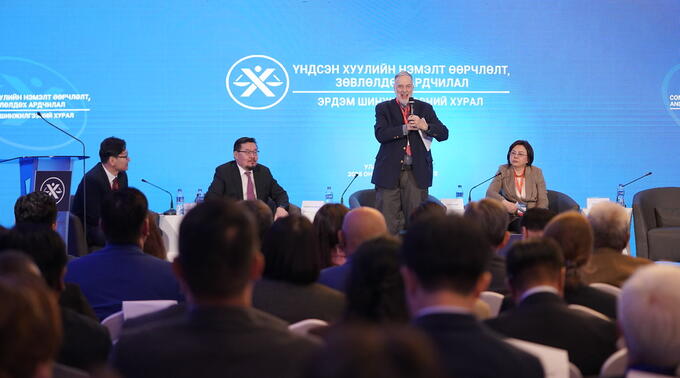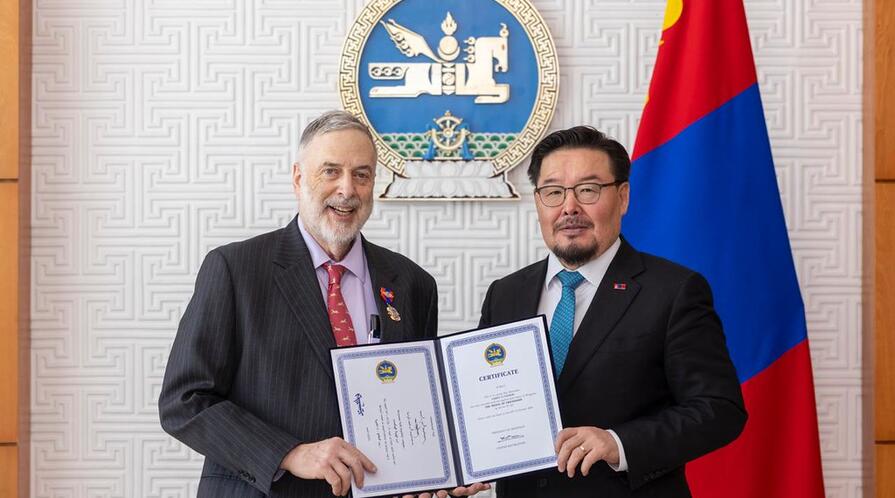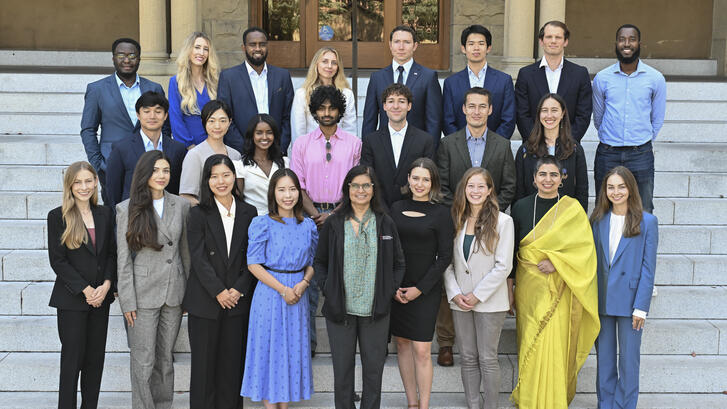Over 400 Participants to Attend the International Conference “Sustainability Dialogue 2025 - Climate Action: Billions of Trees”
The Office of the President of Mongolia, under the auspices of the President of Mongolia and in collaboration with the Ban Ki-moon Foundation for a Better Future of the Republic of Korea and Stanford University’s Walter H. Shorenstein Asia-Pacific Research Center (APARC) of the United States, will host the international conference “Sustainability Dialogue 2025 – Climate Action: Billions of Trees” from June 5-7, 2025, in Ulaanbaatar.
The Sustainability Dialogue serves as a strategic cornerstone for fostering regional collaboration and advancing sustainable development. The dialogue will bring together global policymakers, experts, researchers, and practitioners, who will convene to address shared environmental challenges and tackle the escalating impacts of climate change through urgent and coordinated global action – the vision captured in Sustainable Development Goal 13 (SDG 13) of the United Nations-adopted 2030 Agenda for Sustainable Development. The conference will serve as a platform to reinforce collective commitment to SDG 13 by advancing efforts in mitigation, adaptation, policy integration, education and awareness, and the mobilization of international financial support.
In alignment with the vision of Khurelsukh Ukhnaa, the President of Mongolia and his national “Billion Trees” initiative, the conference will host discussions under the following four themes: Climate Financing for Sustainability; Technical Cooperation, Social Responsibility, and Expertise Sharing; Partnerships for Climate Resiliency and Regional Sustainability; and Climate Action Through Land Restoration and Conservation.
More than 400 participants from 11 countries will attend the conference, including over 40 distinguished speakers from the environmental, financial, and technological sectors. Notable opening speakers include: The 8th Secretary-General of the United Nations and Chairman of the Ban Ki-moon Foundation for a Better Future, H.E. Ban Ki-moon; APARC Director and Stanford's William J. Perry Professor of Contemporary Korea, Professor Gi-Wook Shin; Deputy State Secretary for Hungarian Communities Abroad of the Office of the Prime Minister of Hungary Péter Szilágyi; and Director of the Coordination Office of the G20 Initiative on Land, the United Nations Convention to Combat Desertification (UNCCD), Muralee Thummarukudy, who will also give a keynote speech. Other keynote speakers include Deputy Chairwoman of the State Great Hural (Parliament) of Mongolia Khurelbaatar Bulgantuya, Member of the State Great Hural (Parliament) of Mongolia and Minister of Foreign Affairs Batmunkh Battsetseg, and Environment and Green Development Policy Advisor to the President of Mongolia Nyam-Osor Batkhuu.
“Sustainability Dialogue 2025 – Climate Action: Billions of Trees” builds upon the ongoing Trans-Pacific Sustainability Dialogue initiative launched in 2022 by APARC and the Ban Ki-moon Foundation for a Better Future. This initiative includes the 2022 inaugural convening and the 2023 Dialogue on Energy Security (SDG 7) in Seoul, Republic of Korea; the 2024 Dialogue on Industry, Innovation, and Infrastructure (SDG 9) at Stanford University; and two Trans-Altai Sustainability Dialogue sub-regional convenings in Ulaanbaatar, Mongolia, one focused on Advancing Gender Equity and Women’s Empowerment (SDG 5) in 2023 and the other on Promoting Peace, Justice, and Strong Institutions (SDG 16) in 2024. Together, these convenings have played a critical role in generating impactful contributions to developing sustainable solutions that benefit Asia, the Altai region, and the global community.
- View the announcement by the Office of the President of Mongolia >
- View the conference agenda >
Read More

Building on the Trans-Pacific Sustainability Dialogue initiative launched by Shorenstein APARC and the Ban Ki-moon Foundation for a Better Future, the 2025 Sustainability Dialogue convenes policymakers, researchers, and practitioners to advance progress toward Sustainable Development Goal 13 – Climate Action – of the United Nations-adopted 2030 Agenda for Sustainable Development.








![[Left to right]: Emerson Johnston, Tiffany Saade, Chan Leem](https://fsi9-prod.s3.us-west-1.amazonaws.com/s3fs-public/styles/727x409/public/2025-03/cybernetica.jpg?h=71976bb4&itok=f3lwJ11Y)
![[Left to right]: Julia Ilhardt, Serena Rivera-Korver, Johanna von der Leyen, and Michael Alisky](https://fsi9-prod.s3.us-west-1.amazonaws.com/s3fs-public/styles/727x409/public/2025-03/gerhub.jpg?h=71976bb4&itok=ncTsPzeE)
![[Left to right]: Euysun Hwang, Sakeena Razick, Leticia Lie, and Julie Tamura](https://fsi9-prod.s3.us-west-1.amazonaws.com/s3fs-public/styles/727x409/public/2025-03/disinfo_ghana.jpg?h=71976bb4&itok=m0iXK4Et)
![[Left to right]: Samara Nassor, Gustavs Zilgalvis, and Helen Phillips](https://fsi9-prod.s3.us-west-1.amazonaws.com/s3fs-public/styles/727x409/public/2025-03/aus_space.jpg?h=0d03432e&itok=CHIkKqEP)
![[Left to right]: Sandeep Abraham, Sabina Nong, Kevin Klyman, and Emily Capstick](https://fsi9-prod.s3.us-west-1.amazonaws.com/s3fs-public/styles/727x409/public/2025-03/digital_futures_lab.jpg?h=71976bb4&itok=irALsTsT)
![[Left to right]: Alex Bue, Rachel Desch, and Marco Baeza](https://fsi9-prod.s3.us-west-1.amazonaws.com/s3fs-public/styles/727x409/public/2025-03/cdd_ghana.jpg?h=71976bb4&itok=zmf6_ARg)





















































































